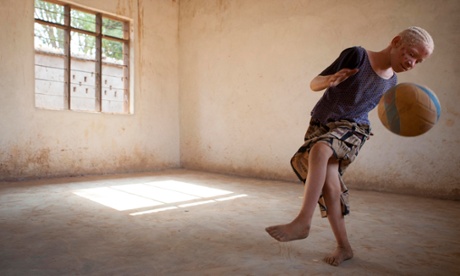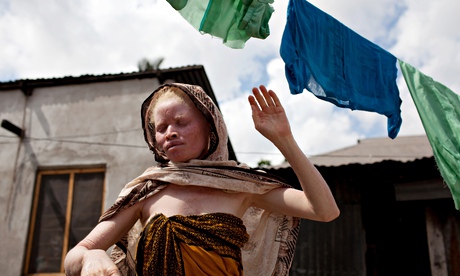It is a Wednesday night in a London pub and a group are about to play their first ever gig. It doesn’t begin well. Some members start singing the wrong song, the keyboard won’t work properly and they don’t all finish at the same time.
But then something happens: the audience claps. The four singers look stunned and overwhelmed, and then Teleza Finias, the band’s only woman, starts jumping up and down with joy. Amidu Didas, a lanky singer in a woolly Arsenal hat, shakes his arms in celebration, while Elias Sostines and Riziki Julius, the other two members, shout, “Tanzania! Tanzania! Tanzania!” over and over, making the crowd shout it back.
The four musicians are members of the 18-strong Tanzania Albinism Collective, and this is not only the first time they have performed on a stage – it is the first time they have been out of their country. It is also definitely the first time they have been shown appreciation by 100 random foreigners. The collective, who belong to one of the world’s most oppressed groups of people, are the team behind an emotional and genre-defying album, White African Power.
TAC come from Ukerewe, Africa’s largest inland island, reached by a four-hour boat ride across Lake Victoria. Tanzania has the world’s largest population of people with albinism – the genetic condition that affects a person’s ability to produce melanin, leaving their skin, hair and eyes pigment-free and at the mercy of the sun. Around one in every 1,400 people in the country has the condition (compared with 1 in 18,000 globally), and many die of skin cancer before they reach 40. Despite its prevalence, discrimination is common, especially in rural areas. It is believed that people with albinism are cursed and bring bad luck. They are frequently ostracised.
“I’m so, so, so, so, so happy,” says Teleza, 31, through an interpreter. “I never thought there would be a day when I would sing and people would actually listen to me. When I was born, my father said I wasn’t his daughter.” Her mother, she says, would have nothing to do with her either, so Teleza was raised by her grandparents, who were so embarrassed by her condition they didn’t let her go to school. “I never even sang in church,” she says. “No one wanted me there.”
Much of the time Teleza lived in fear for her life – with good reason. Between 2006 and 2015, 76 Tanzanians with albinism were murdered, probably for their body parts to be sold to witchdoctors. At least another 65 were attacked. A government crackdown seems to have stopped that, but when Teleza goes out people still call her “deal”, meaning money.
The other TAC members have similar stories. “People wouldn’t let me get water from the wells,” says Elias. “They said if I used them, they would get my condition.” Elias never had an opportunity to sing. Amidu is the only one of the four who had tried to be a musician, even going to the island’s music studio to record a song. He was told to leave.
The collective were brought to Britain by Ian Brennan, a music producer who has worked with Tuareg rockers Tinariwen and other marginalised groups, such as Malawian prisoners and the band Khmer Rouge Survivors. Last summer, he visited Ukerewe to lead a songwriting workshop for people with albinism. It was run by the British charity Standing Voice.
At first, things didn’t look hopeful. Brennan had sent a guitar, bass and keyboard to the community in advance, in the hope the group might start writing songs without him. But when he arrived, the instruments were untouched, and he learned that – aside from one person who was a great guitar player – none of the group had any musical experience.
“The community had been shut down musically,” says Brennan, who tackled their reticence to play by getting everyone to touch and bash the instruments, adding that they could take one home if they came back with a song the next morning. They all did. “It was just so natural,” Teleza says. “I started to write and the words came. I didn’t even need to think.”
“It wasn’t difficult,” adds Elias. “I was singing about all the things in my life. It made me feel like a new person.”
Brennan turned the group’s 25 best songs, most barely a minute long, into White African Power, as raw a debut album as could be imagined. “We knew we were going to record stuff, but we go into every project prepared not to release anything. That’s the only ethical way. I don’t think a good story is enough. But what they’ve done is incredible. It’s totally non-commercial, but it’s original and their voices are incredibly true.”
The album swings wildly – from moments of beauty to blasts of anger, from big group numbers with people grabbing whatever is to hand for percussion (one features a rainwater barrel being hit by a sledgehammer) to dance songs where someone has clearly found the keyboard’s demo button and simply sung over the top. There is often a stark contrast between the song titles – Stop the Murders, Stigma Everywhere – and the fun of the music.
Three days after the London concert, TAC play Womad, the world music festival in Wiltshire. This time they are in front of several hundred people, amid trees and tents offering spoon-making workshops and Indian head massages. There is no nervousness, no keyboard malfunctions, no missed cues. Instead, the four make a dramatic entrance in huge red cloaks, chanting, before throwing them off one by one. They clamber into the crowd and try to get people to chant along in their local dialects. They dance until they are breathless. They get children up on stage. They throw everything at it. Brennan hovers to one side, leading the clapping and introducing some numbers whose harrowing lyrics belie the collective’s happiness to be there.
Teleza says the experience has already changed her. “I’ve not gained anything like money, but the collective has made me feel more confident. And I am starting to have a little bit of a relationship with my mum. That’s the first time.” She smiles broadly and says she now wants Tanzanians to hear her songs. “Hear them – and understand why I’m singing.”
• White African Power is out from Six Degrees Records and available on Spotify.











